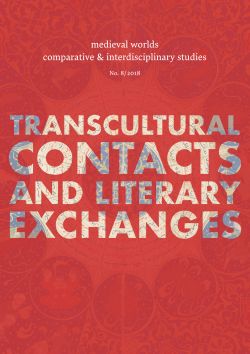Courtney Luckhardt
S. 86 - 108
doi:
10.1553/medievalworlds_no8_2018s86
Verlag der Österreichischen Akademie der Wissenschaften
doi:
10.1553/medievalworlds_no8_2018s86
Abstract:
Travel and communication in the early medieval period were fundamental parts of people’s conceptions about temporal and spiritual power, which in turn demonstrated a ruler’s legitimacy. Examining the role of messengers and diplomatic envoys between the first Umayyad caliph of al-Andalus, ‘Abd al-Rahman III, and his fellow tenth-century rulers in Christian kingdoms, including the Byzantine emperor Constantine VII Porphyrogennetos and the first Holy Roman emperor, Otto I, illuminates internal and external negotiations that defined the pluralistic Iberian society in the early Middle Ages. Formal religious and ethnic differences among Muslim rulers and non-Muslim messengers enhanced the articulation of political legitimacy by the caliph. Diplomatic correspondence with foreign rulers using the multiplicity of talents and ethno-religious identities of their subjects was part of the social order provided by the Andalusi rulers and produced by those they ruled, demonstrating the political authority of the Umayyad caliphate.
diplomacy, messengers, al-Andalus, political authority, ‘Abd al-Rahman III, Muslim-Christian relations
Published Online:
2018/11/30 09:32:46
Object Identifier:
0xc1aa5576 0x003a16ee
Rights:All rights reserved.For questions regarding copyright and copies please contact us by email.
medieval worlds provides a forum for comparative, interdisciplinary and transcultural studies of the Middle Ages. Its aim is to overcome disciplinary boundaries, regional limits and national research traditions in Medieval Studies, to open up new spaces for discussion, and to help developing global perspectives. We focus on the period from c. 400 to 1500 CE but do not stick to rigid periodization.
medieval worlds is open to submissions of broadly comparative studies and matters of global interest, whether in single articles, companion papers, smaller clusters, or special issues on a subject of global/comparative history. We particularly invite studies of wide-ranging connectivity or comparison between different world regions.
Apart from research articles, medieval worlds publishes ongoing debates and project and conference reports on comparative medieval research.
Editor’s Preface
Walter Pohl and Ingrid Hartl
World Literature is Trans-Imperial: A Medieval and a Modern Approach
Christian Høgel
The Global Eminent Life: Sixth-Century Collected Biographies from Gregory of Tours to Huijiao of Jiaxiang Temple
James T. Palmer
The Aristotle of Pippin III. Greek Books Sent to the Frankish Court (ca. 758 AD)
Christian Gastgeber
Biblical Elements and the ‘Other’ in the Chronicon regum Legionensium
Patrick S. Marschner
“The messenger is the place of a man’s judgment”: Diplomacy between Emperors and Caliphs in the Tenth Century
Courtney Luckhardt
The Geopolitics on the Silk Road: Resurveying the Relationship of the Western Türks with Byzantium through Their Diplomatic Communications
Li Qiang and Stefanos Kordosis
Project Reports
Dynamics in Buddhist Transfer in Eastern Central Asia 6th-14th Centuries: A Project Report
BuddhistRoad Team
Mobility, Empire and Cross-Cultural Contacts in Mongol Eurasia (MONGOL)
Michal Biran
Greek into Arabic. Philosophical Concepts and Linguistic Bridges
Cristina D’Ancona, Gerhard Endress and Andrea Bozzi
Writing the History of Aristotelian Logic During the Long Ninth Century. Some Remarks and Preliminary Results
Christophe Erismann
The THESIS Project
Monica Brinzei
Origins of the Vernacular Mode: Medieval Theology, Politics and Religious Identities
Pavlína Rychterová




 Home
Home Print
Print
 References
References
 Share
Share
